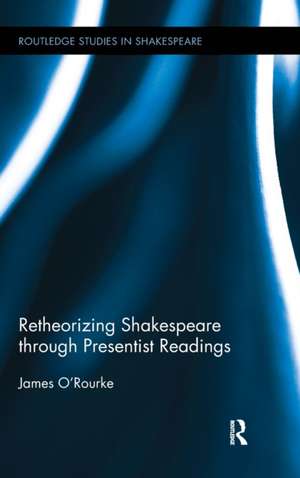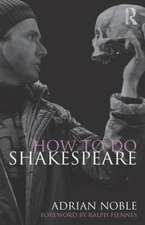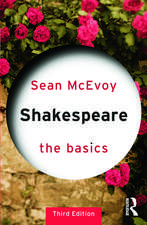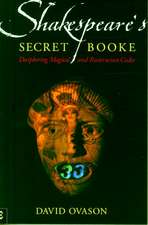Retheorizing Shakespeare through Presentist Readings: Routledge Studies in Shakespeare
Autor James O'Rourkeen Limba Engleză Hardback – 18 noi 2011
| Toate formatele și edițiile | Preț | Express |
|---|---|---|
| Paperback (1) | 258.30 lei 43-57 zile | |
| Taylor & Francis – 14 oct 2024 | 258.30 lei 43-57 zile | |
| Hardback (1) | 1057.40 lei 43-57 zile | |
| Taylor & Francis – 18 noi 2011 | 1057.40 lei 43-57 zile |
Din seria Routledge Studies in Shakespeare
-
 Preț: 311.41 lei
Preț: 311.41 lei -
 Preț: 311.41 lei
Preț: 311.41 lei -
 Preț: 303.80 lei
Preț: 303.80 lei - 9%
 Preț: 934.73 lei
Preț: 934.73 lei -
 Preț: 389.66 lei
Preț: 389.66 lei - 18%
 Preț: 1109.04 lei
Preț: 1109.04 lei - 18%
 Preț: 997.27 lei
Preț: 997.27 lei -
 Preț: 389.66 lei
Preț: 389.66 lei - 26%
 Preț: 820.73 lei
Preț: 820.73 lei - 18%
 Preț: 1109.18 lei
Preț: 1109.18 lei -
 Preț: 251.32 lei
Preț: 251.32 lei - 18%
 Preț: 998.71 lei
Preț: 998.71 lei -
 Preț: 389.66 lei
Preț: 389.66 lei - 26%
 Preț: 762.97 lei
Preț: 762.97 lei -
 Preț: 436.02 lei
Preț: 436.02 lei -
 Preț: 389.66 lei
Preț: 389.66 lei - 25%
 Preț: 766.98 lei
Preț: 766.98 lei -
 Preț: 251.32 lei
Preț: 251.32 lei -
 Preț: 483.49 lei
Preț: 483.49 lei - 18%
 Preț: 1109.18 lei
Preț: 1109.18 lei -
 Preț: 382.91 lei
Preț: 382.91 lei -
 Preț: 389.66 lei
Preț: 389.66 lei -
 Preț: 389.01 lei
Preț: 389.01 lei - 18%
 Preț: 1106.81 lei
Preț: 1106.81 lei - 26%
 Preț: 847.73 lei
Preț: 847.73 lei -
 Preț: 386.18 lei
Preț: 386.18 lei - 18%
 Preț: 1111.55 lei
Preț: 1111.55 lei - 26%
 Preț: 847.08 lei
Preț: 847.08 lei - 18%
 Preț: 1066.44 lei
Preț: 1066.44 lei - 26%
 Preț: 764.69 lei
Preț: 764.69 lei - 18%
 Preț: 1109.18 lei
Preț: 1109.18 lei - 26%
 Preț: 764.85 lei
Preț: 764.85 lei -
 Preț: 447.51 lei
Preț: 447.51 lei - 18%
 Preț: 1112.21 lei
Preț: 1112.21 lei - 18%
 Preț: 1000.27 lei
Preț: 1000.27 lei - 18%
 Preț: 1000.27 lei
Preț: 1000.27 lei - 26%
 Preț: 846.92 lei
Preț: 846.92 lei - 30%
 Preț: 819.90 lei
Preț: 819.90 lei - 18%
 Preț: 1056.71 lei
Preț: 1056.71 lei - 18%
 Preț: 1110.81 lei
Preț: 1110.81 lei
Preț: 1057.40 lei
Preț vechi: 1289.52 lei
-18% Nou
Puncte Express: 1586
Preț estimativ în valută:
202.34€ • 211.79$ • 168.41£
202.34€ • 211.79$ • 168.41£
Carte tipărită la comandă
Livrare economică 31 martie-14 aprilie
Preluare comenzi: 021 569.72.76
Specificații
ISBN-13: 9780415897037
ISBN-10: 0415897033
Pagini: 214
Dimensiuni: 152 x 229 x 18 mm
Greutate: 0.53 kg
Ediția:1
Editura: Taylor & Francis
Colecția Routledge
Seria Routledge Studies in Shakespeare
Locul publicării:Oxford, United Kingdom
ISBN-10: 0415897033
Pagini: 214
Dimensiuni: 152 x 229 x 18 mm
Greutate: 0.53 kg
Ediția:1
Editura: Taylor & Francis
Colecția Routledge
Seria Routledge Studies in Shakespeare
Locul publicării:Oxford, United Kingdom
Public țintă
Academic, Postgraduate, and UndergraduateCuprins
Introduction: Retheorizing Shakespeare 1. Spectres of Intention: Epic Theatre and the Lessons of Theory 2. Boys Will Be Boys: Subtexts and Afterthoughts in the Comedies 3. Racism and Homophobia in The Merchant of Venice 4. Love and Object-Cathexis in Troilus and Cressida: Just One of Those Things 5. The Exotic/Erotic and the Group: Othello 6. King Lear and the Art of Dying Notes Performance Bibliography Index
Recenzii
"His chapters combine local readings and nuanced theoretical insights with attentive close readings to suggest the myriad ways in which Shakespeare’s theater not only resists but also revises dominant political and cultural structures. O’Rourke sees a Shakespeare who is not merely immersed in his culture, but actively reshaping it. Both O’Rourke’s critiques of New Historicism and his readings of various plays present a powerful perspective on Shakespeare’s work, which allows for a Shakespeare who is still in many respects our contemporary." – Renaissance Quarterly
Descriere
This book offers a theoretical rationale for the emerging presentist movement in Shakespeare studies and goes on to show, in a series of close readings, that a presentist Shakespeare is not an anachronism. Relying on a Brechtian aesthetic of "naïve surrealism" as the performative model of the early modern, urban, public theater, James O’Rourke demonstrates how this Brechtian model is able to capture the full range of interplays that could take place between Shakespeare’s words, the nonillusionist performance devices of the early modern stage, and the live audiences that shared the physical space of the theatre with Shakespeare’s actors. O’Rourke argues that the limitations placed upon the critical energies of early modern drama by the influential new historicist paradigm of contained subversion is based on a poetics of the sublime, which misrepresents the performative aesthetic of the theater as a self-sufficient spectacle that compels reception in its own terms. Reimagining Shakespeare as our contemporary, O’Rourke shows how the immanent critical logic of Shakespeare’s works can enter into dialogue with our most sophisticated critiques of our cultural fictions.
















